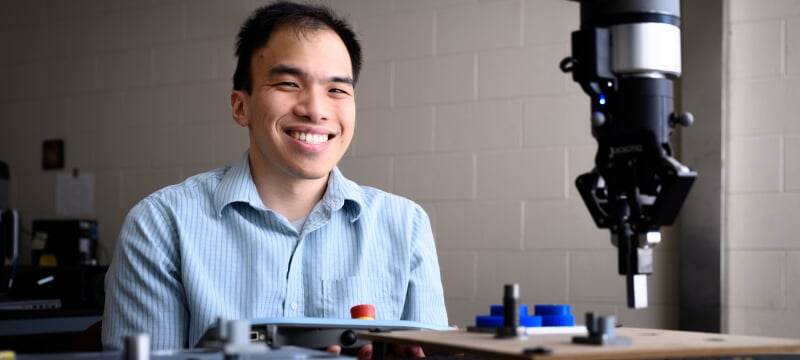The master of engineering degree is intended to be a terminal professional degree where the candidate demonstrates advanced ability in coursework and with an advanced engineering design project, or practicum. The master of engineering student must comply with the requirements on this page, the requirements of their program, and complete any necessary forms to document their progress with the Graduate School.
Campus Residency Requirement
A minimum of one-half of the coursework credits must be taken in residence at Michigan Tech. (Note that this is inconsistent with the general requirement that 2/3 of the coursework be taken in residence. See Senate Proposal 5-98.)
Credit Requirements
Minimum Requirements
Programs may have stricter requirements than listed here and may require more than the minimum numbers of credits listed here.
- Thirty credits beyond the bachelor’s degree are required for a master’s degree.
- Thirty credits beyond the master’s degree are required for a PhD.
- Maximum of 12 credits may be at the 3000 or 4000 level (with program approval).
- MEng allows a maximum of 14 credits at the 3000 or 4000 level.
- One-third of the non-research credits may be transfer credits as long as they were not applied toward another degree.
- Research credits are the only non-graded classes that may be counted toward a degree.
- All credits must meet the Scholastic Standards of the Graduate School in order to be counted toward the credit requirements.
Unallowable Credits
- Courses numbered below 3000.
- Audited courses.
- Continuous enrollment courses (ex: UN5951, UN5953).
- Non-research courses taken for pass/fail courses.
- Credits applied toward another degree (see exceptions below).
- Undergraduate credits (see exceptions below).
Special Exceptions
- A portion of the non-research/non-practicum credits earned at Michigan Tech may be reused to earn an additional master's degree in accordance with Graduate School policy.
- Students in an accelerated master’s program may apply up to nine approved credits earned while an undergraduate toward both their bachelor’s and master’s degrees in accordance with University policy. Each program may set limits on the type and number of credits.
Academic Progress
Students must be in good standing to earn a graduate degree.
Time Limits
All work must be completed within the specified time frame starting from the first enrollment in the degree program or earliest course listed on the degree schedule, whichever is earliest.
- Master’s degree must be completed within five (5) calendar years.
- PhD must be completed within eight (8) calendar years.
Requests for extension must be made by the advisor to the Graduate School.
Responsible Conduct for Research Training
The University requires that all students complete basic responsible conduct for research training. Students completing a dissertation, thesis, or report will also complete advanced responsible conduct for research training. See our Responsible Conduct of Research Training page for details on how to complete the training.
Advisor
All graduate students must have an advisor that meets the requirements of the Graduate School. These individuals advise students on course selection, supervise their research, and play an important role in their professional development.
Initially, students may be advised by the graduate program director for their degree program. However, students must choose a permanent advisor prior to the end of the second academic-year semester in residence or a registration hold will be placed on their account.
Advisory Committee
Master of Engineering students who are completing a practicum must have an advisory committee that meets the requirements of the Graduate School. The purpose of the advisory committee is to provide the student with multiple independent viewpoints to guide the research project, provide advice on the student’s path to the degree, and assess the student’s work.
Coursework
The minimum requirements are as follows:
| Option Parts | Credits |
|---|---|
| Coursework (minimum) | 26-30 Credits |
| Practicum | 0-4 Credits |
| Total (minimum) | 30 Credits |
| Distribution | Credits |
|---|---|
| 5000-6000 series (minimum) | 12 Credits |
| 3000-4000 (maximum) | 14 Credits |
Master of Engineering Practicum
The practicum is an advanced independent study for students in the master of engineering program. The student in consultation with the advisor develops and executes a project demonstrating capabilities in problem solving, communication, and decision making. The practicum can be completed on campus or at the site of a Michigan Tech corporate partner. Students must submit a written report and make an oral presentation related to their project to their advisory committee. In some cases, the practicum may be waived.
The successful on-campus oral presentation will be evaluated by the committee or waived on the Verification of Final Degree Requirements form.
Degree Completion Timeline
The Master of Engineering Degree Completion Timeline shows a detailed timeline of items that you need to complete in order to obtain a degree and prepare for arrival on campus.
Students can view their Degree Progress Checklist for a list of items that are complete or pending for each degree they are pursuing. See the Graduate School's online tutorial for help with their Degree Progress Checklist.
